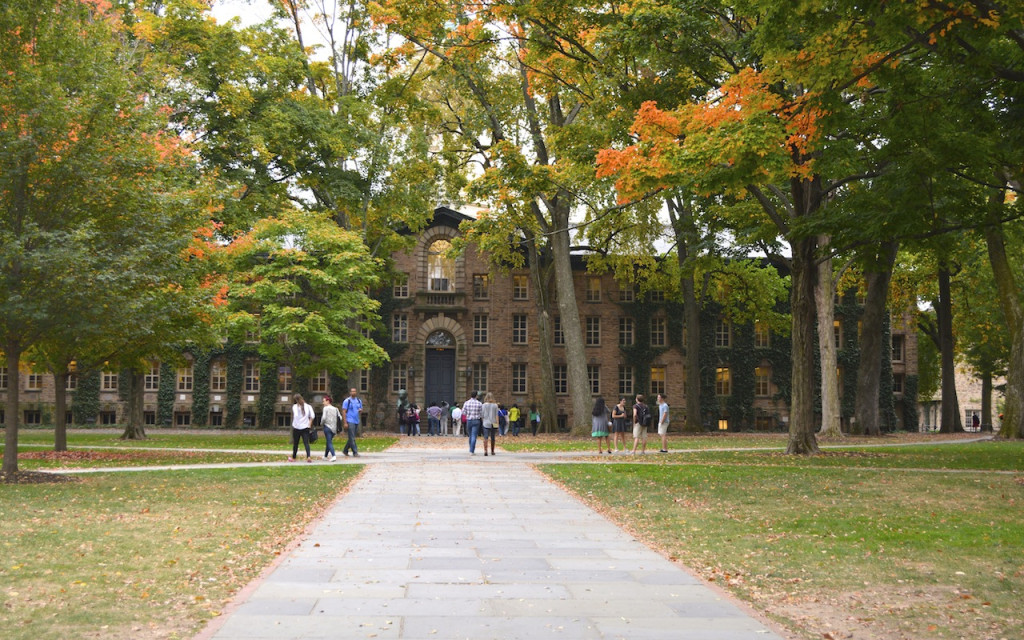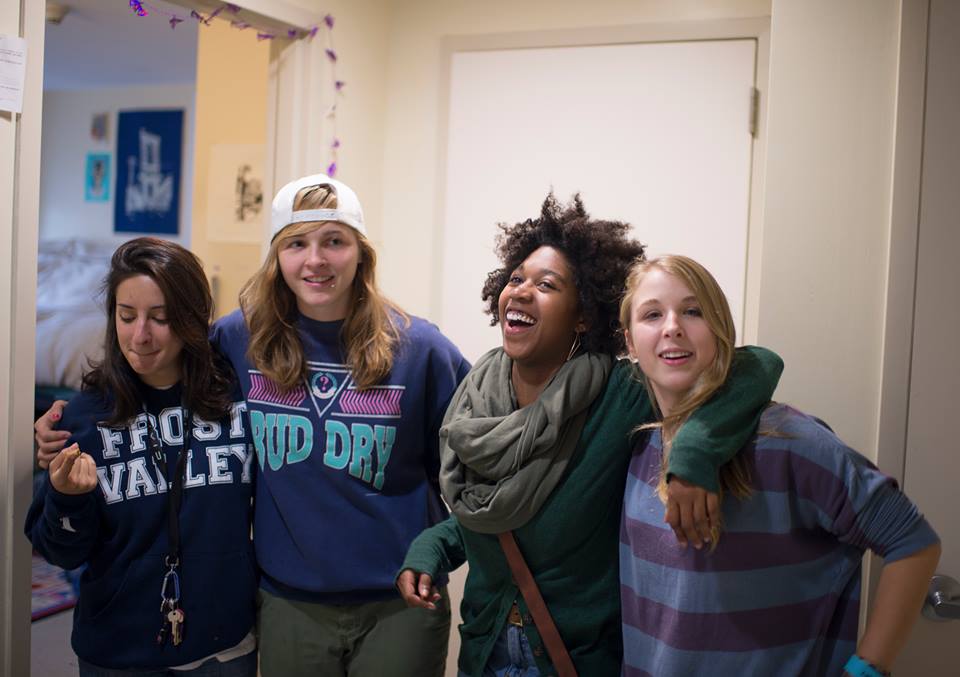Hamptons: You have been accepted to College now What? It has been awhile since I last posted a blog and that is because I have been spreading myself so thin that most days I barely have time to eat lunch or relax. I have dedicated the last year of my life to helping my daughter with her college process and it has been rewarding, stressful, exhausting and nerve-wrenching. Finally, the conversation has changed from how she is going to get in to how are we going to get her stuff there! If I lived local, I would be inclined to use a man with a van Bristol. It’s likely that a van would be needed as she has so many things that she wants to take with her. As we only want to do one journey, it’s important that she organizes all of this stuff properly so that it fits in the van nicely. One of our friends told us to consider crate hire Manchester too. Apparently, those crates would make it easier for my daughter to store all of her items for the move. The crates are strong and easy to stack on top of one another, meaning that more of them can fit inside the van for the move. Perhaps those crates are worth hiring, we might look into that!

I am pleased to say that she applied to 9 colleges to continue her study of Art with an emphasis on Graphic Design and she has been admitted to all 9 of those schools. I’m aware that this won’t be the case for everyone, for a start some people struggle with essay writing so this might of held them back in their attempts to get in. If you feel you might be in the same position as this, then it might be worthwhile to check out this 500 word essay help. Once you’ve got a place at the college of your choice, make sure you don’t have the same struggles by visiting customwritingservice.com.
Our delima falls in the category that most students and parents face in this tough economic time and that is the cost of most of these private institutions. Nothing is more upsetting than seeing your child apply to their 1st choice, being accepted then having to tell your child that this school is too expensive and they cannot go because you cannot afford to pay the tuition. Being middle class is both a blessing and a curse, a blessing because you can provide for your family but a curse because you fall victim to no help at all. The poor will get financial support from both the government and the institutions and the rich do not need the help, but the middle class is just struggling to pay our bills, put food on the table and keep a roof over our heads, we ask for no hand-outs and for that we are often attacked and our kids suffer. Yes your child could make the decision to still go and financially put themselves in a financial crunch all to enjoy the cafeteria food or better dorms, but you the adult know the consequences of this bad decision, when do you step in and talk common sense to your 18 year old? My daughter’s 1st choice tuition is $59,800 per year, how disgusting is that, are you f….. kidding me? For this tuition the application process should not be as difficult as they made it because who the hell can afford this tuition. We do not feel bad in telling our daughter that we cannot afford this tuition because I do not think 95% of American’s could afford this tuition. Statistics show that many adults age 29-30 are moving back home because they have lost their jobs or they have jobs where they cannot not afford to live on their own and pay off their college loans. This is a different time and parents one way or another you are going to be paying the price if you do not step up and talk some common sense into your very naive 17-19 year olds…….I am attaching the 2011 Princeton reviews for your info.
2011 College Hopes & Worries Survey Report
_________________________________________________________________________
The Princeton Review, one of the nation’s best known education services companies, has conducted this survey of high school students applying to colleges and parents of college applicants since the 2002-03 school year. Respondents who complete the survey are readers of the company’s annual “Best Colleges” book and users of its site, www.PrincetonReview.com.
The 2011 survey appeared in The Princeton Review book,
Best 373 Colleges: 2011 Edition (Random House, August 2010) in a paper version readers mailed or faxed to the company. It also ran on
www.PrincetonReview.com where users completed the survey online from late January to early March 2011.
Findings for the 2010-11 survey are based on responses from 12,185 people: 8,219 (67%) high school students applying to colleges and 3,966 (33%) parents of college applicants. Respondents came from all 50 states, DC, the Virgin Islands, Guam, Puerto Rico and several countries abroad.
The company awards a $1,000 college scholarship to one survey participant chosen at random, and it sends 25 participants also chosen at random one of the following Princeton Review books (their choice): ACT or SAT?: Choosing the Right Exam For You, Paying for College Without Going Broke, or The Portable Guidance Counselor.
Press Contact:
Jeanne Krier, Publicist, The Princeton Review Books, Rankings & Surveys, 212-539-1350
__________________________________________________________________________
2011 Survey Questions / Findings
In this report, the percent of respondents overall (students plus parents) choosing an answer is shown to the left of each answer choice. The percent of students and the percent of parents choosing that answer is shown to the right and in parentheses.
The pluralities (answer choices selected by the highest percent of respondents) or the majorities (answer choices selected by 50 percent or more of respondents) are underlined.
The first question, “What would be your “dream” college?…” was fill-in-the-blank. The remaining questions were all multiple-choice. Some questions have been asked annually or in past years, and if so, results for prior years are indicated below.
1) What would be your “dream” college? What college would you most like to attend (or see your child attend) if chance of being accepted or cost were not an issue?”
In their answers to this fill-in-the-blank question, respondents wrote in the names of more than 585colleges, universities and other post-secondary institutions as their “dream colleges” (with some schools being named by only one respondent and others being named by more than 500 respondents as their “dream college”).
The 10 colleges students most named as their “dream college” were:
1/ Stanford Univ., 2/ Harvard College, 3/ New York Univ.,
4/ Princeton Univ., 5/ Massachusetts Institute of Technology 6/ Yale Univ.,
7/ Univ. of California–Los Angeles, 8/ Univ. of Pennsylvania,
9/ Univ. of Southern California, 10/ Univ. of California-Berkeley
The 10 colleges parents most named as their “dream college” for their child were:
1/ Harvard College, 2/ Stanford Univ., 3/ Princeton Univ., 4/ Massachusetts Institute of Technology, 5/ Yale Univ., 6/ Duke Univ., 7/ Brown Univ., 8/ New York Univ., 9/ Univ. of Notre Dame, 10 / Northwestern Univ.
2) How many colleges will you (your child) apply to?
Almost half (45%) of respondents said they/their child will apply to 5 to 8 colleges while 22% said they/their child will apply to 9 or more colleges.
33% One to 4 (33% Students, 31% Parents)
45% Five to 8 (44% Students, 49% Parents)
18% Nine to 12 (18% Students, 17% Parents)
04% Thirteen or more (05% Students, 03% Parents)
Combined: 22% applying to 9 or more.
3) What has been, or do you think will be the toughest part of your (your child’s) college application experience?
The plurality of students (29%) chose the answer “taking admission and placement tests” as the toughest part of their application experience, while the plurality of parents (31%) chose the answer, “completing applications for admission and financial aid.”
21% Researching colleges and deciding which schools to apply to (20% Students, 24% Parents)
28% Taking admission and placement tests – the SAT, ACT, or APs (29% Students,25% Parents)
27% Completing applications for admission and financial aid (26% Students 31% Parents)
24% Waiting for the decision letters and choosing which college to attend (25% Students, 20% Parents)
4) What do you estimate your (or your child’s) college degree will cost, including four years of tuition, room & board, fees, books and other expenses?
Parents’ estimates of college costs were significantly higher than students.
82% of parents estimated their college costs will be more than $75,000 while 66% of students had this estimate.
45% More than $100,000 (41% Students, 57% Parents)
25% $75,000 to $100,000 (25% Students, 25% Parents)
Combined: 70% said More than $75,000 (down 1% from last year)
15% $50,000 to 75,000 (17% Students, 11% Parents)
11% $25,000 to $50,000 (13% Students, 05% Parents)
04% Up to $25,000 (04% Students, 02% Parents)
Combined: 15% said Less than $50,000
5) How necessary will financial aid (education loans, scholarships or grants) be to pay for your (your child’s) college education?
Among respondents overall, 86% said financial aid would be “Extremely” or “Very” necessary with 61% of them saying “Extremely.” More students (88%) than parents (82%) viewed aid as “Extremely” or “Very” necessary. In 2007, the first year this question was asked on the survey, 78% of respondents overall said aid would be “Extremely,” or Very” necessary, with 51% saying “Extremely.”
61% Extremely (62% Students, 60% Parents)
25% Very (26% Students, 22% Parents)
86% said Extremely or Very necessary (same as last year)
12% Somewhat (11% Students, 14% Parents)
02% Not at all (01% Students, 04% Parents)
6) What’s your biggest concern about applying to or attending college?
The plurality (37%) of students and parents overall was most concerned that they/their child “will get into their first choice college but won’t have sufficient funds/aid to attend it.” This has been the plurality of respondents’ biggest concern consistently since 2006. In 2006, the plurality (34%) of respondents were most concerned that they/their child “won’t get into first-choice college.”
25% Won’t get into first-choice college (27% Students, 22% Parents)
37% Will get into first-choice college, but won’t have sufficient funds/financial aid to attend
(36% Students, 37% Parents)
27% Will get into a college I (my child) want(s) to attend, but will take on major loan debt to
afford it (26% Students, 30% Parents)
11% Will attend a college I (my child) may not be happy about (11% Students, 11% Parents)
7) How would you gauge your stress level about the college application process?
Students reported higher stress than parents. Among respondents overall (students and parents combined), 69% reported “Very High” or “High” levels of stress. That’s up 1% from last year and up 13% from 2003 when The Princeton Review first conducted this survey.
25% Very High (26% Students, 22% Parents)
44% High (45% Students, 42% Parents)
Combined 69% Very High or High (up 13% from 2003, first year of survey)
28% Average (26% Students, 33% Parents)
03% Low (03% Students, 03% Parents)
00% Very Low (0% Students, 0% Parents)
8) Ideally, how far from home would you like the college you (your child) attend(s) to be?
Half (50%) of parents would ideally like their child to attend a college less than 250 miles from home. However, the majority (66%) of students would ideally like to attend a college more than 250 from home with 37% of them wishing it would be 500+ miles and 17% wishing it would be 1,000+ miles from home.
39% 0 to 250 miles (34% Students, 50% Parents)
30% 250 to 500 miles (29% Students, 30% Parents)
17% 500 to 1,000 miles (20% Students, 11% Parents)
14% 1,000 miles or more (17% Students, 09% Parents)
9) When it comes to choosing which college you (or your child) will attend, which of the following do you think it is most likely to be?
While the plurality (49%) of respondents overall said they/their child would likely attend the college that will be the “best overall fit,” only about 1 of 10 respondents, since the survey began, indicated they’d choose the college “with the best academic reputation.”
10% College with best academic reputation (11% Students, 08% Parents)
06% College that will be the most affordable (06% Students, 06% Parents)
35% College with best program for my (my child’s) career interests (37% Students, 32%
Parents)
49% College that will be the best overall fit (46% Students, 54% Parents)
10) If you (your child) had a way to compare colleges based on their commitment to environmental issues (from academic offerings to practices concerning energy use, recycling, etc.), how much would this contribute to your (your child’s) decision to apply to or attend a school?
A majority (65%) of respondents overall said having such information would contribute “Strongly,” “Very Much,” or “Somewhat” to their decisions (up 1% from last year), while 35% of them indicated said it would contribute “Not Much” or “Not at all.” Students placed higher value on this information than parents did.
07% Strongly (08% Students, 05% Parents)
17% Very Much (20% Students, 12% Parents)
41% Somewhat (41% Students, 40 % Parents)
Combined 65% Somewhat, Very Much or Strongly (up 1% from last year)
25% Not Much (23 % Students, 30% Parents)
10% Not at All (08% Students, 13% Parents)
Combined 35 % Not Much or Not at All
11) Has the state of the economy this year affected your (your child’s) decisions about applying to or attending college?
Among respondents overall (students and parents combined), 72% say the economy has affected their decisions about college. That’s up 4% from last year. Almost 3 out 4 students (74%) as compared to almost 2 out of 3 parents (65%) said the economy has affected their college decisions.
14% Yes: Extremely (14% Students, 12% Parents)
23% Yes: Very Much (24% Students, 21% Parents)
35% Yes: Somewhat (36% Students, 32% Parents)
Combined 72% Yes (up 4% from last year)
28% No: Not at all. (26% Students, 35% Parents)
12) If your answer to the previous question was one of the “Yes” choices, how would you describe the major way the economy has affected your (your child’s) college application decisions?
The majority (52%) of respondents overall said they are applying to more “‘financial aid safety’ schools” (a 18% increase over the 34% of respondents that selected this answer in 2009 of the same three answer choices).
23% Am applying to colleges with “lower sticker prices” (21% Students, 29% Parents)
52% Am applying to more “financial aid safety” schools (54% Students, 48% Parents)
25% Am applying to colleges closer to home to save on travel (25% Students, 23% Parents)
13) What will be the biggest benefit of your (your child) attending college and earning a college diploma?
Among respondents overall (students and parents combined), 61% see the main benefit of a college degree as a potentially better job / higher income and career training rather than the education per se. That’s up 6% from last year.
26% The education (26% Students, 26% Parents)
13% The exposure to new ideas (13% Students, 12% Parents)
Combined 39% chose answers related to education and learning
42% The potentially better job and higher income (42% students, 42% Parents)
19% The training for a specific career (19% Students, 20% Parents)
Combined 61% chose answers related to job, income and career.
14) For our school profiles, we collect a lot of data directly from the colleges on everything from their admission/acceptance stats to their financial aid and graduation rates. Of the following data points, which would you be most interested in knowing about a college you (your child) may be researching?
Among both student and parent respondents, the plurality (38%) are most interested in the average SAT score ranges of a college’s admitted freshmen.
38% Average SAT score ranges of its admitted freshmen last year (38% Students, 38% Parents)
24% Percent of applicants the college accepted last year (27% Students, 16% Parents)
21% Percent of undergraduates receiving financial aid (21% Students, 22% Parents)
17% College’s graduation rate (percent of students graduating in years) (14% Students, 24% Parents)
15) (optional) What advice would you give to college applicants or parents of applicants going through this experience next year?
“Start early” has been the advice most given by students and parents every year. About 50% of respondents say this. See sampler of students’ and of parents’ advice on the “College Hopes & Worries” area of Princeton Review site.


